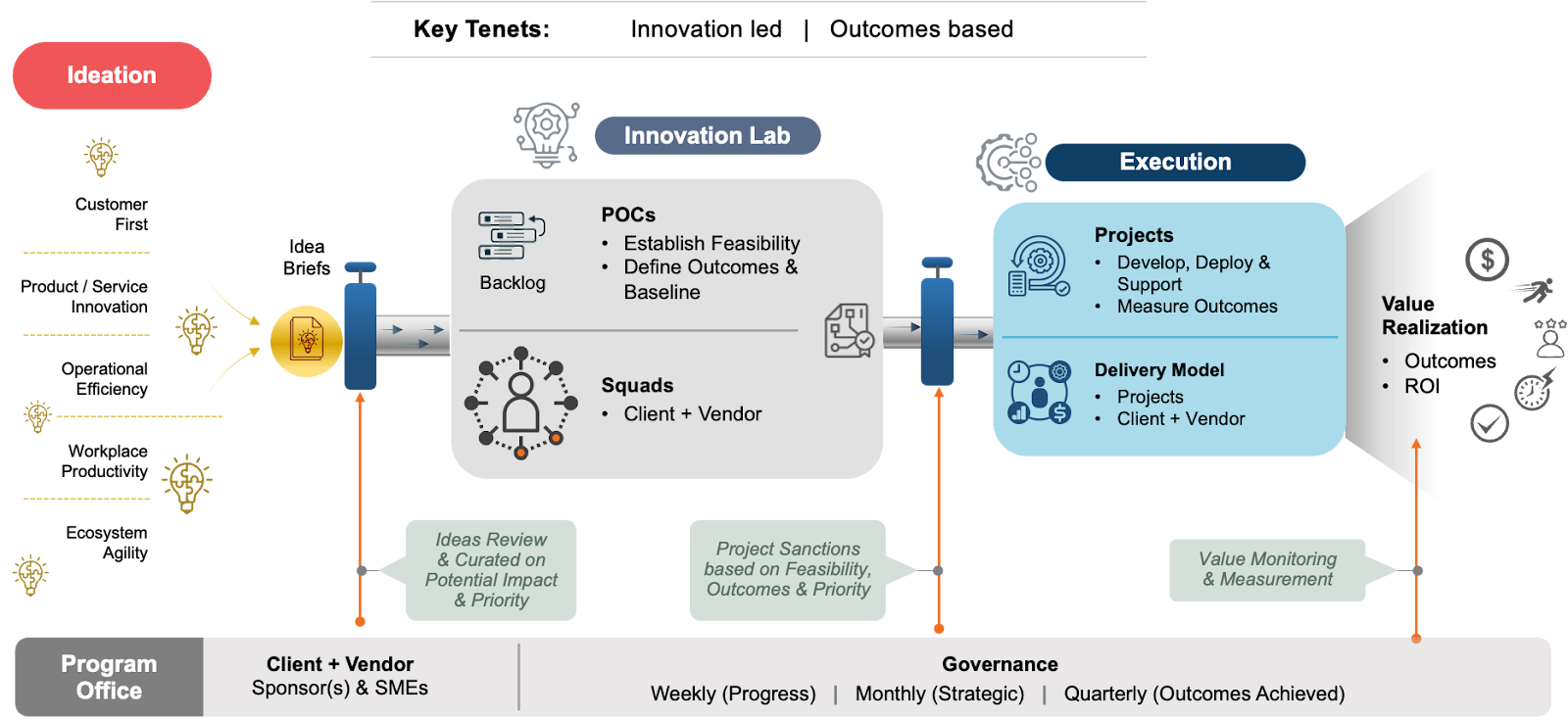Brand Stories
Navigating Challenges and Driving Success, ETCIO

The 2021 collapse of ‘Zillow Offers’ serves as a stark reminder of what can go wrong when AI is deployed without the right safeguards. Built to automate home buying, Zillow’s algorithms frequently misjudged market conditions – causing the company to overpay for thousands of homes. With unsold inventory piling up, Zillow took nearly a billion dollars in losses, laid off 2,000 employees, and eventually shut down the program.
While this played out in the consumer space, similar risks are surfacing inside enterprise AI pilots across banking, pharma, and manufacturing where agentic models are being rushed into production without the governance. However, real-world adoption of Agentic AI presents a complex landscape. What looks promising in a lab can fall apart in production. The gap between PoC and scalable success remains wider than most leaders realize.
The AI adoption journey
According to Gartner’s 2024 survey, a striking 80% of Generative AI proof of concepts (PoCs) fail to make it to full-scale production. Most enterprises begin their AI journey by collaborating with existing technology vendors and engaging strategy consulting firms to craft a tailored AI roadmap. This typically leads to the identification of a few proof-of-concept (PoC) initiatives aimed at testing AI’s viability within specific business processes.
However, the initial excitement often gives way to sobering realities. One of the first hurdles is accuracy and efficacy. Off-the-shelf AI solutions, regardless of the underlying large language models (LLMs), frequently deliver only 75-80% accuracy when deployed. For AI to be truly useful in business-critical scenarios, enterprises must aim for 95% or higher accuracy. Achieving this requires addressing both data quality and algorithmic sophistication – a dual challenge that many organizations underestimate.
The data dilemma
A major barrier to effective AI implementation is the nature of enterprise data. Historically, data has been curated for human consumption – structured to support manual analysis and decision-making. AI, on the other hand, thrives on digitally accessible, high-quality data that can fuel autonomous decision-making. This mismatch creates what is known as the “Data for AI” problem. Enterprises must invest in digitalizing their processes, segmenting truly digital data, and building robust data pipelines. Ensuring data quality, traceability, and lineage is essential for developing trustworthy AI systems. Depending on an organization’s data maturity, this transformation can be both time-consuming and costly.Governance and responsibility
Another critical challenge is establishing a governance framework for autonomous AI agents. While “agentifying” business processes can empower human workers and enhance productivity, it must be done responsibly. Without proper oversight, AI decisions can lead to unintended consequences. This is where Responsible AI comes into play. Enterprises must implement guardrails that ensure AI decisions are observable, auditable, and aligned with ethical standards. Continuous monitoring by human decision-makers is essential to maintain control and accountability.
A real-world success story: AskChemille
A standout example of Agentic AI in action is AskChemille, developed by a leading chemical manufacturer to transform how prospects engage with complex polymer solutions. In just six months and with less than half of a full-time equivalent’s cost, the company deployed an AI-powered search-and-answer experience designed to achieve two primary goals: reduce a traditionally 12-month sales cycle that relied heavily on experienced chemistry SMEs, and promote a self-service portal for prospects seeking tailored, expert-level guidance.
Powered by a Small Language Model (SLM) trained to match the expertise of a PhD chemist, AskChemille can accurately answer technical questions and recommend customized solutions, delivering a 75% improvement in sales cycle time and achieving a full ROI within the first quarter of deployment. This showcases how Agentic AI can leapfrog traditional knowledge transfer processes and deliver immediate, high-impact business value by autonomously adapting to user needs and driving outcomes.
The ART of AI success
To navigate these challenges, enterprises should adopt the ART framework focusing on Accuracy, Responsible, and Trustworthiness for AI. These three pillars form the foundation of successful AI implementation. Ignoring any of them introduces significant risk and undermines the potential benefits of AI. To accelerate AI adoption and maximize its impact, organizations should consider the following strategic actions:
- Educate Leadership on AI’s True Potential
- Move beyond the hype around LLMs and chatbots.
- Emphasize AI’s role in scaling human capabilities and enhancing decision-making.
- Integrate machines as trusted collaborators in driving informed decisions
- Invest in Data Maturity
- Digitalize core processes and identify gaps in data readiness.
- Build infrastructure that supports high-quality, AI-ready data.
- Define AI Vision Through Business Outcomes
- Align AI initiatives with key growth, profitability, and operational metrics.
- Ensure AI efforts are outcome-driven, not technology-driven.
- Focus on interoperability and orchestration of agents.
- Articulate ART Goals
- Customize agentic experiences based on business needs.
- Define trust goals, talent requirements, and observability standards.
- Involve business leaders in AI governance through councils and cross-functional teams.
3 Steps to Productionizing AI
To move from PoC to production, enterprises should build on the ART framework and follow three essential steps:
Step 1: Pilot with purpose: Anchor your use case to a clearly defined business outcome.
Step 2: Pick the right tech stack: Choose a platform that supports agent interoperability and future scalability.
Step 3: Co-create for value: Partner with a service provider who can share ownership of value realization. (See sample process below.)
Agentic AI holds immense promises for enterprises, but its adoption requires a thoughtful, strategic approach. By focusing on accuracy, responsibility, and trustworthiness, organizations can unlock AI’s full potential while mitigating risks. The journey may be complex, but with the right vision and investments, enterprises can build intelligent systems that truly empower their workforce and drive sustainable growth.
The author is Uday Hegde, Co-founder & CEO, USEReady
Disclaimer: The views expressed are solely of the author and ETCIO does not necessarily subscribe to it. ETCIO shall not be responsible for any damage caused to any person/organization directly or indirectly.
Brand Stories
Logistics innovations showcased at Shanghai’s World Artificial Intelligence Conference

Enterprises in the logistics industry are showcasing latest advancements that push technological boundaries at the ongoing 2025 World Artificial Intelligence Conference (WAIC), which opened in Shanghai on Saturday.
Shanghai Westwell Technology, which specializes in intelligent solutions in the bulk logistics sector, is highlighting its upgraded Q-Tractor P40 Plus, which is making its global debut at the “Global Solidarity in the AI Era” themed event.
This driverless, new energy tractor targets scenarios involving air cargo, industrial parks and logistics centers, with an impressive 200km endurance and five-minute battery swap capability.
Addressing labor shortages and efficiency gaps, Westwell, which has more than 200 clients across 28 countries and regions, said it delivers not just autonomous vehicles but an integrated smart freight solution combining fleet management, energy solutions and safety systems to build “smart airports”.
Its Q-Tractor products have already been deployed at Hong Kong International Airport, Hong Kong Air Cargo Terminals and the cargo terminal of Sichuan Airlines at Chengdu Shuangliu International Airport.
Kuaidi 100, a one-stop service platform for global express logistics and cloud service provider of express logistics information within China, is exhibiting its technical accumulations and industrial practices at the event.
The enterprise launched an “AI in all and all in AI” strategy in 2023, aiming to drive continuous innovation for all products through AI. At its booth, the enterprise highlights its recent blockbuster releases, including a digital intelligence map for China’s express logistics network, which contribute to the improvement of basic capabilities regarding logistics digital intelligence in the country.
Shanghai-based robotics firm AgiBot broadcast its embodied intelligent robots performing logistics operations from the exhibition hall. The robots demonstrated that, with multimodal perception and real-time data feedback, they can realize whole-process automation of complex logistics tasks.
Brand Stories
Bhatti calls for integration of artificial intelligence in governance | Hyderabad News

Hyderabad: Deputy chief minister Bhatti Vikramarka on Saturday said that the Marri Chenna Reddy Human Resource Development Institute (MCRHRDI) should provide training to all the principal secretaries and village-level officials to facilitate the integration of artificial intelligence (AI) in governance.Addressing the governing body sub-committee meeting of the institute, Bhatti expressed his desire for Telangana to become the first state in the country to integrate AI in governance fully. “Proper training must be imparted to achieve this goal,” he said. “College principals must be trained on the steps required to obtain NAAC accreditation. This would enhance the chances of securing Central funds. Two-day training sessions must be conducted at district and mandal levels for self-help group (SHG) leaders to help them advance financially and become economically empowered,” Bhatti said.Stating that the MCRHRD institute should be positioned as the best training institute in the country, the deputy chief minister assured full support from the govt. “The institution spans 30 acres and is headed by a highly experienced former chief secretary. Officials and staff must make the best use of the services offered by the institute. The institution must strive for self-sufficiency and achieve financial growth. Only then will it evolve to the expected standards,” he said.“For the past ten years, the MCRHRD institute has been neglected. Going forward, the sub-committee will meet once every six months to monitor progress. Institute officials and staff must be equipped to adapt to the latest global technologies and developments,” he said. Roads and buildings minister Komatireddy Venkat Reddy, IT minister D Sridhar Babu, MCRHRD director general, and vice-chairperson A Santi Kumari attended the meeting.
Brand Stories
CheQin.ai sets a new standard for hotel booking with its AI capabilities: empowering travellers to bargain, choose the best, and book with clarity.

The global hotel booking experience has long been defined by routine: scroll endlessly, compare rates, hope for transparency, and settle for what’s available. For many, the process feels more transactional than empowering. But a shift is emerging in the hospitality sector, one that aims to put genuine control and clarity back in the hands of both guests and hoteliers. At the forefront is CheQin.ai, a platform fundamentally rethinking the way hotels and travelers connect.
From Passive Searching to Active Requesting
Unlike conventional platforms that require users to sift through dozens of listings, CheQin.ai introduces a model where guests articulate their exact requirements, room preferences, amenities, stay dates and invite hotels to respond with tailored offers in real time. This guest-driven approach replaces guesswork with choice and ensures travelers receive the most relevant options without the fatigue of endless scrolling. For groups, families, or those with specific needs, the process is refreshingly direct.
Transparent Pricing – No Surprises, No Hidden Fees
For travelers, hidden fees and opaque terms remain persistent frustrations. CheQin.ai addresses these head-on, insisting that all offers are all-inclusive: the price a guest sees is the price they pay. The platform’s zero-commission model enables hotels to pay no listing or booking fees and fosters a healthier marketplace, encouraging hoteliers to compete on genuine value, not marketing budget or hidden margins.
A Level Playing Field for Competitive Bargaining
CheQin.ai reframes hotel booking as a win-win exchange. Once a request is posted, hotels can view competitor offers and adjust their pricing in real time. This transparent competition creates an environment where guests receive up to five of the lowest, direct offers, each one clear, competitive and tailored to their needs. For hoteliers, it’s an opportunity to fill rooms and engage directly with guests, minus the overhead of traditional commission structures.
Technology That Enables Human Choice
At its core, CheQin.ai employs technology not as a substitute for service, but as an enabler of better decision-making. Instant notifications, direct hotel-guest communication, and streamlined booking processes ensure that the platform remains efficient and intuitive. Features such as bulk bookings, flexible stay durations and day-use options reflect a nuanced understanding of modern traveler requirements.
Reflecting Broader Industry Trends
The emergence of platforms like CheQin.ai is emblematic of a wider movement within hospitality: a demand for flexibility, fairness and transparency. The traditional, one-size-fits-all approach is giving way to systems where user agency is prioritized and where competition among providers ultimately benefits the end user.
Clarity and Control for All
For the modern traveler and hotelier alike, CheQin.ai sets a compelling new benchmark. Guests are empowered to bargain and select from transparent, real-time offers; hoteliers engage with motivated travelers in a commission-free environment. The result is a marketplace where both sides participate on equal terms and where clarity so often missing in hotel bookings becomes standard.
Disclosure: The author has no financial interest in CheQin.ai or any companies mentioned in this article. This article is based on independent analysis and observations of current trends in the hospitality industry.
-

 Brand Stories6 days ago
Brand Stories6 days agoBloom Hotels: A Modern Vision of Hospitality Redefining Travel
-

 Brand Stories23 hours ago
Brand Stories23 hours agoCheQin.ai sets a new standard for hotel booking with its AI capabilities: empowering travellers to bargain, choose the best, and book with clarity.
-

 Destinations & Things To Do7 days ago
Destinations & Things To Do7 days agoUntouched Destinations: Stunning Hidden Gems You Must Visit
-

 AI in Travel7 days ago
AI in Travel7 days agoAI Travel Revolution: Must-Have Guide to the Best Experience
-

 Brand Stories3 weeks ago
Brand Stories3 weeks agoVoice AI Startup ElevenLabs Plans to Add Hubs Around the World
-

 Brand Stories2 weeks ago
Brand Stories2 weeks agoHow Elon Musk’s rogue Grok chatbot became a cautionary AI tale
-

 Asia Travel Pulse3 weeks ago
Asia Travel Pulse3 weeks agoLooking For Adventure In Asia? Here Are 7 Epic Destinations You Need To Experience At Least Once – Zee News
-

 Destinations & Things To Do19 hours ago
Destinations & Things To Do19 hours agoThis Hidden Beach in India Glows at Night-But Only in One Secret Season
-

 AI in Travel3 weeks ago
AI in Travel3 weeks ago‘Will AI take my job?’ A trip to a Beijing fortune-telling bar to see what lies ahead | China
-

 Brand Stories3 weeks ago
Brand Stories3 weeks agoChatGPT — the last of the great romantics














You must be logged in to post a comment Login